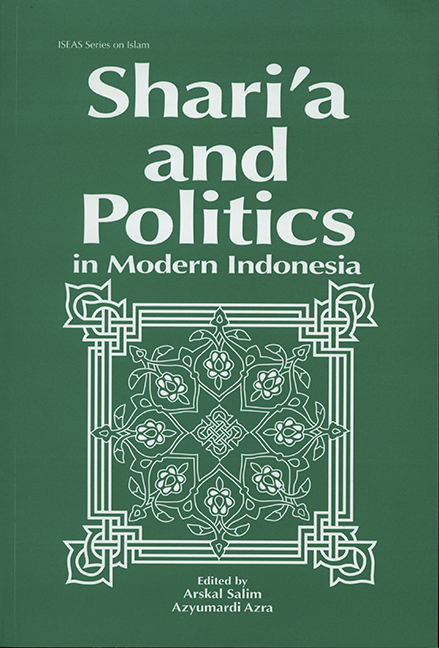Book contents
- Frontmatter
- Contents
- Acknowledgments
- List of Contributors
- Glossary
- 1 INTRODUCTION: The State and Shari'a in the Perspective of Indonesian Legal Politics
- 2 LAW AND POLITICS IN POST-INDEPENDENCE INDONESIA:A Case Study of Religious and Adat Courts
- 3 THE STATE AND SHARI'A IN INDONESIA
- 4 THE STATE'S LEGAL POLICY AND THE DEVELOPMENT OF ISLAMIC LAW IN INDONESIA'S NEW ORDER
- 5 THE INDONESIAN MARRIAGE LAW OF 1974: An Institutionalization of the Shari'a for Social Changes
- 6 INDONESIA'S 1989 RELIGIOUS JUDICATURE ACT: Islamization of Indonesia or Indonesianization of Islam?
- 7 THE POLITICAL BACKDROP OF THE ENACTMENT OF THE COMPILATION OF ISLAMIC LAWS IN INDONESIA
- 8 ISLAMIZING CAPITALISM: On the Founding of Indonesia's First Islamic Bank
- 9 FATWA AND POLITICS IN INDONESIA
- 10 ZAKAT ADMINISTRATION IN POLITICS OF INDONESIAN NEW ORDER
- 11 ISLAMIC VALUES, LAW AND EXPECTATIONS IN CONTEMPORARY INDONESIA
- 12 EPILOGUE: Shari'a in Indonesia's Current Transition: An Update
- APPENDICES
- Bibliography
- Index
4 - THE STATE'S LEGAL POLICY AND THE DEVELOPMENT OF ISLAMIC LAW IN INDONESIA'S NEW ORDER
Published online by Cambridge University Press: 21 October 2015
- Frontmatter
- Contents
- Acknowledgments
- List of Contributors
- Glossary
- 1 INTRODUCTION: The State and Shari'a in the Perspective of Indonesian Legal Politics
- 2 LAW AND POLITICS IN POST-INDEPENDENCE INDONESIA:A Case Study of Religious and Adat Courts
- 3 THE STATE AND SHARI'A IN INDONESIA
- 4 THE STATE'S LEGAL POLICY AND THE DEVELOPMENT OF ISLAMIC LAW IN INDONESIA'S NEW ORDER
- 5 THE INDONESIAN MARRIAGE LAW OF 1974: An Institutionalization of the Shari'a for Social Changes
- 6 INDONESIA'S 1989 RELIGIOUS JUDICATURE ACT: Islamization of Indonesia or Indonesianization of Islam?
- 7 THE POLITICAL BACKDROP OF THE ENACTMENT OF THE COMPILATION OF ISLAMIC LAWS IN INDONESIA
- 8 ISLAMIZING CAPITALISM: On the Founding of Indonesia's First Islamic Bank
- 9 FATWA AND POLITICS IN INDONESIA
- 10 ZAKAT ADMINISTRATION IN POLITICS OF INDONESIAN NEW ORDER
- 11 ISLAMIC VALUES, LAW AND EXPECTATIONS IN CONTEMPORARY INDONESIA
- 12 EPILOGUE: Shari'a in Indonesia's Current Transition: An Update
- APPENDICES
- Bibliography
- Index
Summary
The growing discontent under guided democracy and the pressure of deteriorating economic conditions under Sukarno brought about political violence and social conflict on an unparalleled scale in Indonesia's history. This was the opposite of Sukarno's ideal of uniting different ideological stream – nationalism, communism and Islam – under his guided democracy. The abortive coup of September 1965 which was followed by the destruction of the communist party and its anti-religious ideals marked a turning point in the history of the Indonesian nation. While the full story behind the September 30th movement, as it was named thereafter, remains subject to conflicting interpretations, there can be no doubt about the result of the coup. The most important result was the end of the Sukarno era and the emergence of the New Order government.
This article will look at the legal and judicial changes brought about by the New Order government and will seek to analyze the impact of “Pancasila” ideology and “developmentalism” (pembangunan)– the two key words of the New Order regime's basic policy– on Islamic law and institutions, especially the agama(religious) courts. The weakening, and later disappearance, of formal Islamic political parties from the national political stage and the enforcement of singular adherence to “Pancasila” have usually been understood as having suppressed and curbed the progress of Islamic law and institution in the search for national legal system. However, this article will seek to show that those policies and programs, in addition to posing a tremendous challenge to the proponent of Islamic law and institution, at the same time created a valuable opportunity and a favorable climate for Islamic law and its institutions to develop, adapt and participate in the formation of the national legal and judicial system.
THE RISE OF THE NEW ORDER
The political power of Sukarno, who had been nominated as president for life and had dominated the Indonesian political scene since before independence waned considerably soon after the abortive coup. His remaining influence was effectively broken when he kept trying to play down the demands of fast growing counter-movements led by the anti-communist army generals, Muslim organization and student leaders.
- Type
- Chapter
- Information
- Shari'a and Politics in Modern Indonesia , pp. 48 - 75Publisher: ISEAS–Yusof Ishak InstitutePrint publication year: 2003

